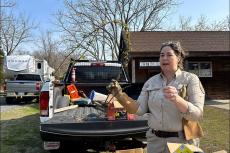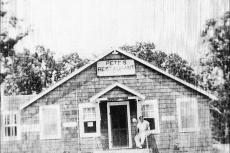Despite a last-ditch effort by Kevin Cooper, director of ordinance enforcement for East Hampton Town, the town planning board, in a vote of 5-2, has approved the six-year-old application for Hero Beach, a Montauk resort, to convert two units in its basement to a kitchen, purportedly to serve hotel guests.
In an Aug. 11 letter to the board, Mr. Cooper wrote: “Ordinance Enforcement is totally against the language ‘guest of a guest’ or ‘guest of an overnight guest’ being placed in the covenant for the resort.” He said it would be “very difficult” for code enforcement officers to verify who might be a “guest of a guest,” and called it “irresponsible” to place the full burden of proof on code enforcement, rather than tightening the language to clarify and limit use of the kitchen.
“I firmly believe that this language should be changed so that it cannot be massaged by another Montauk entity that is clearly looking to stretch a definition as far as they can to make a profit,” wrote Mr. Cooper. “Mr. Krasner,” an owner of Hero Beach, “massages and stretches to the best of his abilities for his other businesses, and he is trying to accomplish this again.”
The crux of Hero Beach’s application has always been its eagerness to serve food on premises. At first, the resort sought to convert an entire building to a restaurant. The planning board was against that, citing parking limitations and an increase in wastewater. By this past spring, Hero Beach had curtailed its request, asking only for a basement kitchen for room service. The planning board looked favorably on the change, provided it included a covenant limiting the use of the kitchen to hotel guests, thus ensuring that people could not park there and drop in for a meal.
Samuel Kramer, the chairman of the planning board, and Tiffany Scarlato, the lawyer for Hero Beach, agreed on the following language pertaining to the kitchen: “Other than catered events, which shall be subject to application to the Town for a Mass Gathering Permit, food/kitchen and room service will service only overnight guests of the hotel and guests of overnight guests of the hotel, as well as hotel staff and hotel ownership and families and guests of hotel ownership.” Such “catered events” might include, for example, weddings, with guests presumably taking over the entire hotel.
Sharon McCobb, a planning board member, kept her comments brief. “I read the covenants and restrictions and I’m ready to sign on,” she said.
Randy Parsons, who at the board’s last meeting said he would wait to see the final language before making a judgement, was not impressed — in fact, downright skeptical.
“I just think in every aspect — parking, wastewater — that this clearly does not meet our standards and we should draw a line and deny this application.” He agreed with Mr. Cooper that the covenant would be impossible to enforce.
The hotel ownership had given the board a list of “over 15 owners” and their families who would be able to dine at Hero Beach. “It’s just absurd,” Mr. Parsons said.
“I’d be lying if I said I had no concern,” said Ian Calder-Piedmonte, another board member. “For me, it’s always been about parking. Our code instructs us that if we’re going to allow something like this, they’ve got to add mitigation, and I think the covenants meet that threshold. I’m going to vote for it.”
Louis Cortese, though, was incredulous. He doubted the ownership was worried about servicing the few people that guests of the resort might bring with them.
“Do you really think that’s what they’re so concerned about?” he asked the board. “If you do, go ahead, approve it. I think the reason they’re fighting so hard to put that language in is because they want to open up the definition, they want to create a loophole and make it obscure.”
“They’re a sophisticated group,” he said. “The investment strategy is to buy a property, add value to it, and then sell it at a gain.”
Mr. Kramer took a different tack completely. “I come from the perspective that we shouldn’t be writing a covenant with the assumption that it will be violated, or that the applicant is looking for a covenant that it can violate. I think that presumes bad faith, and I’m not going to presume bad faith on the part of any applicant.”
“The question is, are we ameliorating the potential issue with parking with the language in this covenant, and I think that we are,” he said. “I understand you can come up with nightmare scenarios, but at the end of the day it would be bad business to deliberately violate the covenant.”
“Do you mean to tell me,” asked Mr. Cortese, “if you were the owner, you would request language in the covenant because you’re afraid you can’t eat there? Don’t you think they’re putting it in there for some other reason?”
“If they are, I’m not here to speculate,” said Mr. Kramer.
“It’s a matter of what could this turn out to be,” countered Mr. Cortese. “A lot of people are violating the code in Montauk, and that’s what it comes down to. It’s partying and serving liquor and creating crowds
— going over the limit. This allows them to do it.”
“The point of whether our words are perfect or not is a good point,” said Mr. Calder-Piedmonte. “The idea that we would overly restrict it, assuming that they’re going to violate, is not.”
“The idea that this is room service is ridiculous,” said Mr. Parsons. “It’s not room service.”
“For six years we’ve scrutinized this application,” said Ms. McCobb. “They wanted a restaurant.”
“They think they’re getting one,” said Mr. Parsons.
“They’re not, Randy,” she said.
By way of protest, Mr. Parsons declined to raise the application to a vote. Ms. McCobb did.
Mr. Kramer, Mark Hansen, Ed Krug, Mr. Calder-Piedmonte, and Ms. McCobb voted to approve it. Mr. Parsons and Mr. Cortese voted against it.
“I live in Montauk. I’m going to catch a lot of shit for this,” said Mr. Cortese.



